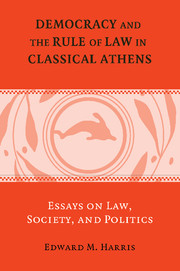Book contents
- Frontmatter
- Contents
- PREFACE
- ACKNOWLEDGMENTS
- ABBREVIATIONS
- INTRODUCTION
- I LAW AND CONSTITUTIONAL HISTORY
- II LAW AND ECONOMY
- 1 Law and Economy in Classical Athens: [Demosthenes] Against Dionysodorus
- 2 When Is a Sale Not a Sale? The Riddle of Athenian Terminology for Real Security Revisited
- 3 Apotimema: Athenian Terminology for Real Security in Leases and Dowry Agreements
- 4 The Liability of Business Partners in Athenian Law: The Dispute between Lycon and Megacleides ([Dem.] 52.20–1)
- 5 Did Solon Abolish Debt-Bondage?
- 6 Notes on a Lead Letter from the Athenian Agora
- III LAW AND THE FAMILY
- IV ASPECTS OF PROCEDURE
- V ENVOI
- BIBLIOGRAPHY
- INDEX LOCORUM
- SUBJECT INDEX
2 - When Is a Sale Not a Sale? The Riddle of Athenian Terminology for Real Security Revisited
Published online by Cambridge University Press: 25 February 2010
- Frontmatter
- Contents
- PREFACE
- ACKNOWLEDGMENTS
- ABBREVIATIONS
- INTRODUCTION
- I LAW AND CONSTITUTIONAL HISTORY
- II LAW AND ECONOMY
- 1 Law and Economy in Classical Athens: [Demosthenes] Against Dionysodorus
- 2 When Is a Sale Not a Sale? The Riddle of Athenian Terminology for Real Security Revisited
- 3 Apotimema: Athenian Terminology for Real Security in Leases and Dowry Agreements
- 4 The Liability of Business Partners in Athenian Law: The Dispute between Lycon and Megacleides ([Dem.] 52.20–1)
- 5 Did Solon Abolish Debt-Bondage?
- 6 Notes on a Lead Letter from the Athenian Agora
- III LAW AND THE FAMILY
- IV ASPECTS OF PROCEDURE
- V ENVOI
- BIBLIOGRAPHY
- INDEX LOCORUM
- SUBJECT INDEX
Summary
in athens during the late classical and hellenistic periods, it was customary for a man who was borrowing a large sum of money to pledge some property as security for the repayment of his loan. To show that his property was legally encumbered, a flat slab of stone, called a horos, was set up, and an inscription, indicating the nature of the lien on the property, was inscribed on the horos. These horoi served to warn third parties that the man who pledged the property as security was not free to sell it or otherwise alienate it until the loan was repaid. The terminology that is used on these horoi to indicate that the property has been pledged as security varies. On a relatively small number of horoi, only seven, the property is described as “lying under (an obligation)” (ὑποκειμένου, -ης, ων) for a debt, the amount of which may or may not be specified. The texts found on a far greater number of horoi, some 128 in all, use a different type of expression. On these horoi, the property is said to have been “sold on condition of release” (πεπραμένου, -ης, -ων ἐπì λύσει). The terminology used on the horoi to describe this kind of lien presents a striking contrast with that employed by the Attic orators: in their speeches we find the verbs ὑποκεĩσθαι and ὑποτιθέναι when it is a question of pledging security for a loan, but never πέπρασθαι with the addition of the prepositional phrase ἐπì λύσει.
- Type
- Chapter
- Information
- Democracy and the Rule of Law in Classical AthensEssays on Law, Society, and Politics, pp. 163 - 206Publisher: Cambridge University PressPrint publication year: 2006
- 1
- Cited by



